| ISLAND Newsletter - October 2020 |
View in browser | Print |
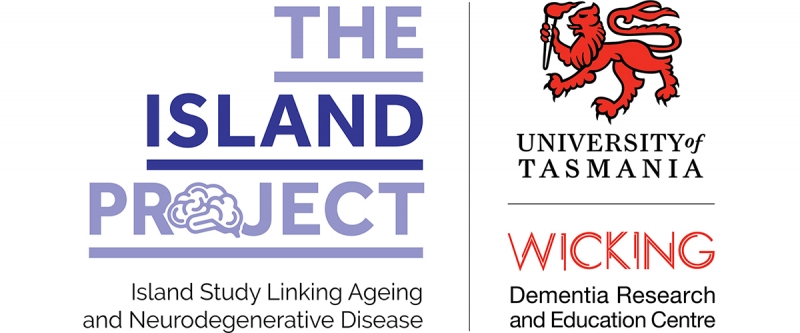 | | | 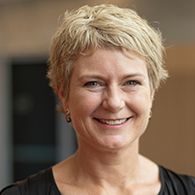
Welcome to this edition of the ISLAND Newsletter. I'm Dr Larissa Bartlett, ISLAND Research Fellow at the Wicking Dementia Centre. I'd like to take this opportunity to give a big shout out to our research participants. Your time and contributions to this project make it possible for us to further our knowledge of dementia prevention and advance our aims of reducing the incidence of dementia in Tasmania. So, thank you very much! If you haven't yet joined ISLAND research you can do so any time, by following the instructions to do the baseline surveys on your ISLAND Home page. We are coming up to an important milestone in the project - our first annual assessments! The annual assessments enable us to look at change over time, when compared to your baseline responses. Many of the surveys will be the same, so we can make these comparisons. We will use the information provided in the annual assessments to see if what we are doing in the ISLAND Project is making a difference to dementia risk in our ISLAND members. Completing the surveys is, as always, voluntary, and we would be so grateful if you can complete as many as you can. The survey invitations will be sent in the coming weeks, so please look out for our email. Thank you again for participating in the ISLAND Project.
| | Annual assessments | 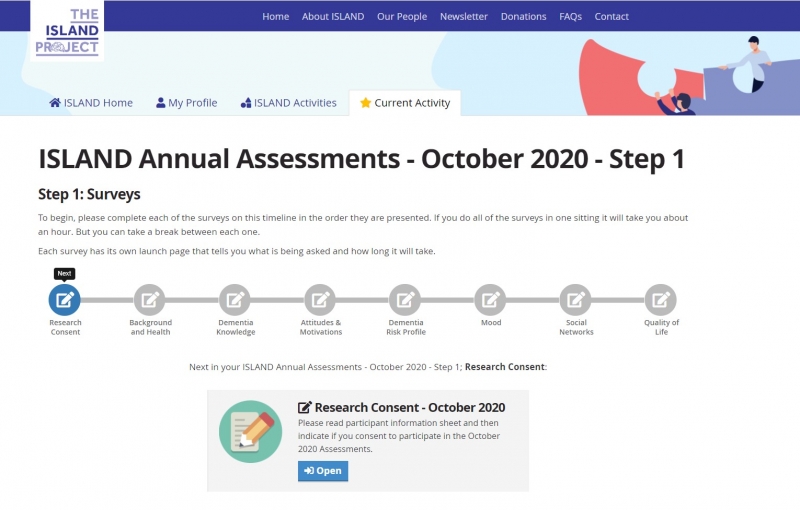 | |
We have been busy preparing the ISLAND Home portal for the first of our annual assessments. If you’ve joined ISLAND research, you will know that after you have completed your baseline, you will be asked to do these annual assessments so that we can track changes in dementia risk-related behaviours over the coming years. While baseline is all self-report surveys, the annual assessments include some cognitive tasks that measure your memory and thinking, and also the opportunity to donate a blood sample for our biological investigations.
We are well aware that for our participants, being involved in our research involves sharing lots of information without getting a diagnosis or personal feedback. It’s very different going to a doctor. This taps into one of the key reasons for our research: the evidence isn’t yet available for doctors to be able to tell you with confidence how you can personally reduce your dementia risk, based on the things you do in daily life. ISLAND will help build this evidence! So please know the information you provide by doing our surveys and assessment tasks is incredibly valuable for informing future health policy and practice in relation to dementia prevention. Research participants: the email with your link to these assessments will arrive in your inbox later in October. If you haven’t yet joined the research but are interested in doing so, log into your ISLAND Home page and follow instructions to do your Baseline surveys.
| | Research update | 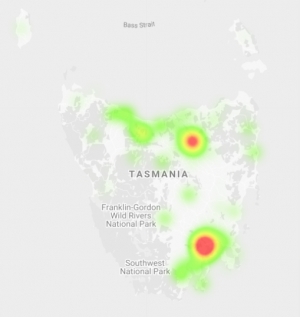
Profiling ISLAND
Using data you’ve already provided to understand who has joined ISLAND, and what we need to do to ensure we have a cohort that is representative of the Tasmanian population. You can see where our participants come from in the map of Tasmania. There are some under-represented areas and demographics. We could do with more men and people who have worked, or are still working in technical, manual or front-line service roles (e.g. farmers, tradies, hospitality workers). The reason we need a representative cohort is so we can be confident the results from our research are relevant for the whole population. Our Project Team is working on ways to encourage people from all walks of life to join up. If you would like to, you can help us achieve our goal by sharing this newsletter within your networks with some encouragement to join ISLAND research.
| 
COVID-19 and dementia prevention
Using the data our ISLAND research participants provided in October 2019 and in April 2020, we have just finished a research paper about the effects of COVID-19 containment on dementia risk factors. We will share the paper with you as soon as it is accepted for academic publishing.
| | It's not too late to enrol in the Preventing Dementia MOOC | 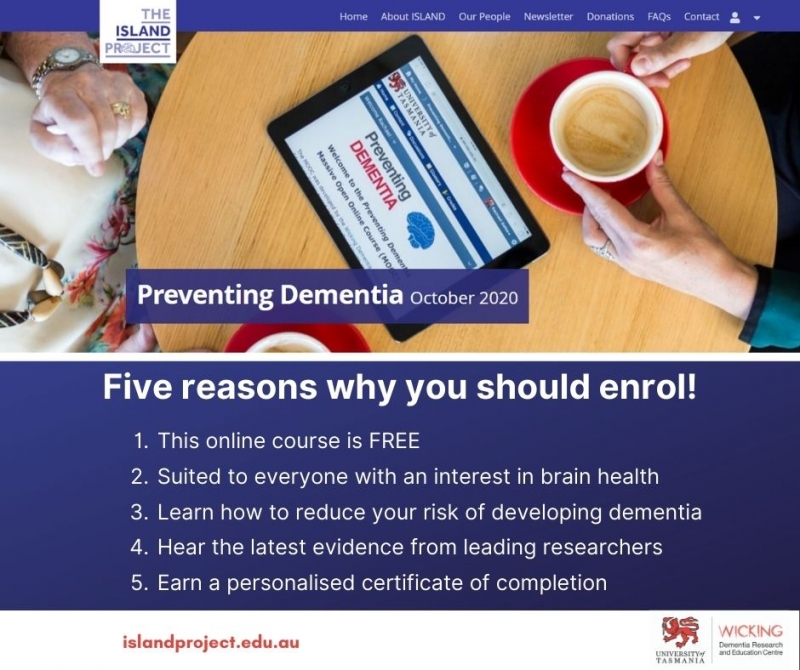 | |
This short online course is very highly rated by past participants as a way to learn what is actually known about preventing dementia. The information is kept up-to-date by researchers and teachers at Wicking, so it is likely that if you did the PD-MOOC a few years ago, some of the content will have changed as new evidence has emerged. The PD-MOOC content is supported with great little videos so you can watch and listen to most of the information – you don’t have to do a lot of reading, although there are plenty of links to references and articles you can follow to get more details should you wish to. We do encourage all of ISLAND participants to do the PD-MOOC. Part of the research we are doing in ISLAND involves assessing whether doing this course leads to stronger changes in dementia risk behaviours and lifestyle factors, and ultimately to reducing dementia risk. We recently finished a pilot study of the PD-MOOC in Tasmania’s North West (some of you will have been involved in the RReDI-NoW Project, thank you!). The results from this pilot should be available to share with you next year.
| | State of the evidence - Ginko Biloba | 
Ginkgo biloba is an extract taken from the Ginkgo tree, that’s been used in ancient medicines for centuries. Some evidence suggests that Ginkgo may have anti-inflammatory properties, and that it may help increase blood flow to the brain. Ginkgo can be taken as an oral supplement or in a tea, and many researchers have looked at whether Ginkgo might be beneficial for a range of different diseases, including those that cause dementia. Some studies have reported potential benefits of Ginkgo to those with Alzheimer’s disease or vascular dementia, in terms of improving their cognition. However, this finding is not consistent across all studies. In a recent meta-analysis, researchers were unable to identify any clinically meaningful changes in cognition, activities of daily living, quality of life and psychiatric symptoms, that were related to Ginkgo consumption in people with various diseases that cause dementia. Other studies of healthy, older adults have failed to find any benefit of Ginkgo supplements for reducing incidence of dementia. To date, there is no evidence to suggest that Ginkgo can prevent or cure dementia.
| | The brain changing effects of exercise | 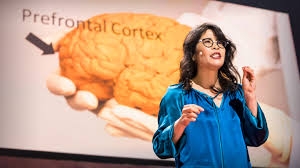
Boost your mood and your memory
What is the most transformative thing you can do for your brain today? EXERCISE! In this TED video, neuroscientist Wendy Suzuki tells us how exercise can boost your mood and memory. If nothing to date has motivated you to exercise, maybe this video will! Brain Changing Benefits of Exercise
| | ISLAND Project Partners | |
|  | |
The University of Tasmania received funding from the Australian Government. Views and conclusions expressed in this publication are those of its authors, and may not be the same as those held by the Department of Health.
|
|
Stay Connected:
|


|
islandproject.utas.edu.au
|
| |
|
|